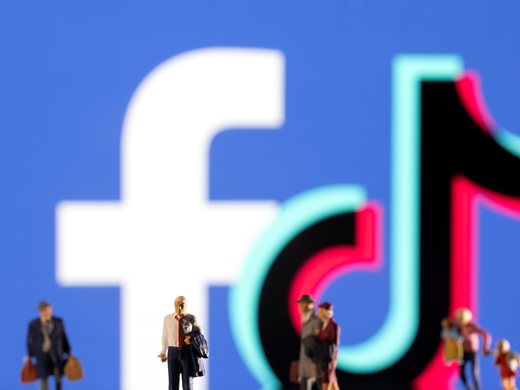The January 17 announcement by publishing house Condé Nast that it was folding its music publication website, Pitchfork, into men’s magazine GQ and firing much of its staff was a shocking blow to the United States’ (and thus much of the world’s) music industry. That the most influential music criticism site, capable of making and breaking careers, could be taken down, was a chilling portent in a media landscape already littered with previously essential but rapidly declining media outlets.
Here was yet more proof that journalism and culture are seen as nothing more than interchangeable market commodities, to be shuffled or discarded according to the icy, profit-driven whims of their corporate masters.
There is a lot of truth to this account. But the push for the commodification of culture and knowledge that ruined Pitchfork and has decimated the media landscape is not just a capitalism-driven blight; it’s encoded in the very way we think about the internet itself.
As much as the loss of Pitchfork will hurt bands and music fans directly, it also represents the definitive refutation of one of the founding myths of the internet era, which is that an internet free from intrusive regulation would lead to the blossoming of multiple new, vibrant forms of expression.
And expression did blossom. It just has had a lot of trouble sticking around.
Pitchfork was initially the embodiment of this promise: a web-based upstart that, to the delight of Gen Xers, dethroned Rolling Stone, that ossified boomer institution that never met a Springsteen album it didn’t like, as the voice of music journalism. Pitchfork’s ultimate folding into a men’s fashion magazine imprint (as if women don’t like music) is very much in keeping with the internet of today: thoroughly commercialized and homogenized, our means of expression filtered through the templates of a few social media sites.
“Fictitious Commodities”
Placing Pitchfork, whose imperial remit had grown beyond the indie rock of its early days to include both more mainstream and experimental genres, under a men’s magazine betrays how transactionally Condé Nast sees Pitchfork’s actual writing and subject matter.
There’s a term for this: “fictitious commodity.” The expression was coined 80 years ago by the economic theorist Karl Polanyi to describe things that were bought and sold in the market, like commodities, but that had purposes beyond the market. An example is journalism, which plays an essential, irreplaceable democratic role in holding power to account.
Another example is music criticism, which exists to inform and to educate, including about music — itself an expression of human culture. It is a good in and of itself, but when commodified, it is repurposed to another objective. When it doesn’t deliver an expected return, it’s junked, or reshuffled, with no care given to the non-market effects.
This foundational internet ideology sees all knowledge as interchangeable, as data. And this philosophy has important real-world effects.
Not Only Capitalism Is to Blame
The fictitious commodification of knowledge is a widespread phenomenon in our market-based society. Knowledge commodification can occur through its deployment to sell advertising. It’s at work when a company such as Google degrades its search results to deliver more advertising revenue, with no care as to whether it’s delivering useful knowledge to its users.
While the commercialization of the internet has certainly led to the pernicious rise of the fictitious commodification of knowledge, fictitious commodities aren’t just a capitalist phenomenon but an internet one as well.
The internet has been designed to move data from one place to another. Its basic design principle — the value commitment embedded in the internet itself — is that the network should not discriminate among different types of data. From this perspective, all knowledge is reduced to the form of data, and discriminating among different types of data is seen as a violation of fundamental norms.
This foundational internet ideology sees all knowledge as interchangeable, as data. And this philosophy has important real-world effects. As scholars Corinne Cath and Niels ten Oever have remarked separately, it translates into a tendency to resist attempts to deal with human rights issues (beyond maximizing free speech) or promoting a healthy information ecosystem through regulation. That’s because the steps needed to ensure these protections require proactive measures to promote one kind of information (for example, journalism) over another, or to block socially harmful speech (for example, hate speech). We see the same logic play out in cultural policy debates, where an internet ideology assumes that promoting cultural works (say, of minority-language cultures) interferes with the free flow of culture as data.
The assumption that all knowledge can be reduced to data, and that all data can be — and should be — treated equally, is not a market-driven ideology but a view about what constitutes knowledge itself. It’s the idea, for example, behind generative artificial intelligence (AI) and large language models (LLMs). This technology probabilistically recombines existing works within its data set (which is largely created without permission from the original authors) to create human-sounding text chains.
Condé Nast commodified (repurposed) Pitchfork’s writing for market-based reasons without caring about the actual content, effectively treating its writers’ works like interchangeable widgets. In the same way, generative AI commodifies (repurposes) others’ creative work. Computational cognitive scientist Iris van Rooij correctly calls LLMs tools for “automated plagiarism.” “By design,” she notes, LLMs create “texts based on ideas generated by others without the user knowing what the exact sources were.”
Attributing authorship isn’t just necessary to help readers judge whether a text is accurate. It’s also central to the way that we’ve conducted scientific research — by evaluating the reliability and validity of assertions — for the past several centuries.
In contrast, LLMs break texts down as data, recombining them as products that, as I’ve said, are merely probabilistic simulacra of scientific knowledge. As I’ve noted elsewhere, this is a direct attack on the scientific world view itself.
Embrace Knowledge Decommodification
As Polanyi argued, the unfettered spread of fictitious commodities can undermine a society. In the case of knowledge, the collapse of commercial journalism, including Pitchfork, is a direct consequence of treating journalism not as a necessity for society to function, but as a commercial asset to be bought, sold or eliminated for financial reasons.
Similarly, allowing unfettered generative AI undermines our information ecosystem, and not only by making it impossible to trust the accuracy of LLM-created texts. LLMs can only recombine what’s in their database, and they only output words and sentences that are statistically likely to already appear in text. As a result, LLMs can only reflect past experience and prevailing biases. As van Rooij points out, “the use of LLMs for writing academic texts would further promote those biases, rather than challenging them as good scholars would want to do.”
Addressing both the general collapse of media in the face of economic pressures, and LLMs’ threat to the integrity of our knowledge ecosystem, requires ensuring that we don’t treat knowledge like a commodity but recognize that it has intrinsic value that must be promoted actively.
Successive Canadian governments have recognized the importance of decommodifying knowledge. The idea behind CanCon, as well as Bills C-11 and C-18, the Online News Act, was that culture and journalism are important in and of themselves and should not be left to be commodified endlessly by the marketplace. Such policies recognize that government economic support is required to create and disseminate culturally and socially important knowledge.
Regarding LLMs, that the problem is not just economic but stems from the technology’s threat to the integrity of knowledge itself, highlights how simply compensating authors for using their work in LLMs (as is being attempted in a number of copyright lawsuits) will not be enough to restrict the commodification of knowledge. Commodification isn’t just a market phenomenon. When it comes to LLMs, addressing their social harms will require focusing not on ensuring that creators are compensated, but on whether they should be allowed to operate at all.
The loss of Pitchfork will be felt by musicians and music fans for years to come. But hopefully, it will serve as a reminder of the need to respect and directly promote and protect culture, knowledge and those who produce both. Some things are too important to commodify.



